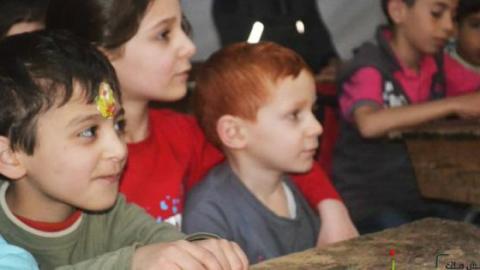Syrian activists have taken up the responsibilities of self-management and self-government in areas liberated from the regime, but the lack of total stability has had an impact on children. With most schools closed or destroyed, and their parents missing or overwhelmed by the daily struggles, children wander around the streets, playing games such as "Assad soldier vs. Free Soldier", or "Checkpoints".
In this context, several initiatives have emerged that seek to educate children amid the current context of chaos and hardships. Maha Mustafa Qurman, founder of one of these new schools, explained to Syria Untold how she and her deceased husband came up with the idea when they traveled to Bustan al-Qasr and saw how many children were wandering around in the street, exposed to the sight of all the weapons and the remnants of violence. They decided to open a school to start teaching some basic subjects. It is called Mustafa Qurman school, in memory of Maha´s husband.
Regarding the academic program, Maha explained that the old program is riddled with praises and worship of the Assad family and the Baath party, which teachers work on removing.
She also mentioned the fact that some of the schools in the liberated areas receive funding from religious donors and institutions, which comes with a larger presence of religion in the academic curriculum. "It is not the case of our school", she added. "So far, we are following the old program but removing the parts where the Assad ruling and figures are praised."
The Freedom Generation is the name of another teaching initiative that focuses on displaced children living in refugee camps. Hiba al-Shawaf, one of the teachers, explained to Syria Untold how she identified huge cultural and educational shortcomings when she talked to some of the children in the camps. "This is why we decided to open the school next to the camps", she said. "We had to teach inside the tents at a certain point, but we have worked hard to try and provide the kids with a real space, a real educational environment where they can feel safe."

Providing such an environment seems to be a constant challenge. "The things these kids have seen are heartbreaking," Hiba recalls. "I heard a five-year-old girl tell me the story of how she walked the street picking pieces of her neighbors´ bodies, two little kids who had lost their limbs as a result of a shelling, and putting them on a bag."
"There is hope, though," the teacher adds. "We have this kid who lost a leg, yet she stands out for being the most active and disciplined. She wants to participate in everything and enjoys it more than anyone. She´s an inspiration."
The schools are created in improvised locations, including mosques and other spaces, which vary from area to area. Even though most of the teaching is developed in the liberated areas, people like Hiba have also started to give private tutoring to small groups of children in areas that remain under regime control, as restrictions prevent them from leaving home.
Despite the difficulties, which include the constant risks and dangers associated with living in war zone, and the lack of funding, the teachers do their best to provide a safe, clean and inspiring environment for the children.
"Whatever happens, we will remain committed to education", one of the teachers assured, "as the most powerful tool for our children and the future of our country."



